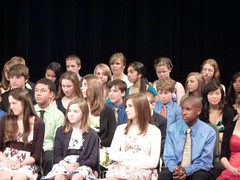I was looking at it this morning, and I realized that I haven’t posted any “Scholarship Reviews” since way back in March and in response to Marilyn Cooper’s essay in the February College Composition and Communication. Talk about falling off the wagon/giving up on a resolution! Well, I have various excuses, including pesky distractions from teaching, conferences, and life. But I wanted to get back to it with a couple brief and belated reviews of articles on assessment.
What I’m thinking about here is Jeff Rice’s “Networked Assessment” in Computers and Composition March 2011, and Chris Gallagher’s “Being There: (Re)Making the Assessment Scene,” which was in CCC from February 2011. As a preface here, let me come clean and admit that I have kind of a bad attitude about assessment. I understand formal assessment procedures are important for both internal self-reflection and external justifications and/or approval, etc., etc., but I generally find this part of my job and this kind of scholarship kind of, well, boring. And I especially don’t like performing assessment in response to some external threat call, but more on that in a bit.
Both Gallagher and Rice use the word “network” in their articles, but they use those terms in very different ways, as Jeff discussed on his blog way back when. Gallagher is using the term network more or less as synonymous with “relationships,” and he also references Burke’s darmatism as a way of explaining the relationship between various stakeholders (I hate that word– I’m not saying that Gallagher is making heavy use of it, just saying I hate that word) in the assessment process. He includes various charts, including one that (idealistically?) includes students at the center (467). Rice is referencing “network” as Latour uses it, which (to be simplistic and brief about it) is about the trace and dialog between all sorts of constituents/stakeholders. Think very detailed ethnographies, tracings that go beyond just a “thick notebook” to show all of the sorts complexities involved in the workings of the assessed (31-32). Rice argues on his blog that Gallagher misapplies network theory; I think that it’s more that Gallagher simply does not have Latour and “network theory” in mind when he employs the word “network.”
For Gallagher, assessment (as he discusses it, especially in relationship to “neoliberalism”) is an external phenomenon: that is, some administrator or accrediting body asks for evidence that you are doing something right. The network he’s talking about navigating is between teachers, students, administrators (I assume both WPAs and what I refer to around EMU as “the suits”) and what he describes on his chart as a “policy/corporate/technical/elite.” This can mean all sorts of groups, but more or less entities demanding accountability. So while Gallagher is suggesting we understand these relationships as existing as a network that is more complex than a simple hierarchy, he is still assuming the motivation for assessment in the first place comes from outside and (more or less) higher up.
Rice’s focus is assessment as a self-motivated and guided process. I think he makes an extremely compelling argument that most conventional notions of assessment are designed to generate answers that the assessors (and the assessed) want. For example, NCATE asks EMU (and other universities that certify school teachers) to prove X, Y, Z and– guess what?!– it turns out that the answers EMU gives proves X, Y, and Z. That isn’t a truth-seeking or discovery activity. Instead, what Rice is proposing ala Latour is more a mapping/descriptive activity, assessment as a way of figuring out what is actually being done and describing that network.
Both of these articles have strengths and weaknesses. I think Gallagher is describing an approach for negotiating assessments that can often be an “us” versus “them” landscape. But I tend to agree more with Rice’s take and purposes for assessment, though one of the problems is he doesn’t really have a chance to follow through on his plan. He ended up moving from his position as the WPA at the University of Missouri to a new gig at the University of Kentucky. What he’s suggesting here seems like a good idea though.
Two last thoughts: first, when I was originally reading these pieces back in March and April, they sure seemed a lot more important. Long story short, we have had at EMU an institutional assessment process that is/was complete pointless bullshit, and just as I was going to have to start thinking about this earnestly as the program coordinator, the provost quit and/or was fired. So as of right now, there is a collective “what’s the point” sentiment on campus.
Second, I’d like to see some kind of administrator– a department head, a dean, whatever– ask faculty to do a self-assessment where they describe three things they think they do well, three weaknesses, and three strategies for minimizing the weaknesses and maximizing the strengths. And I’d like to see these be less than three pages.


 Will
Will